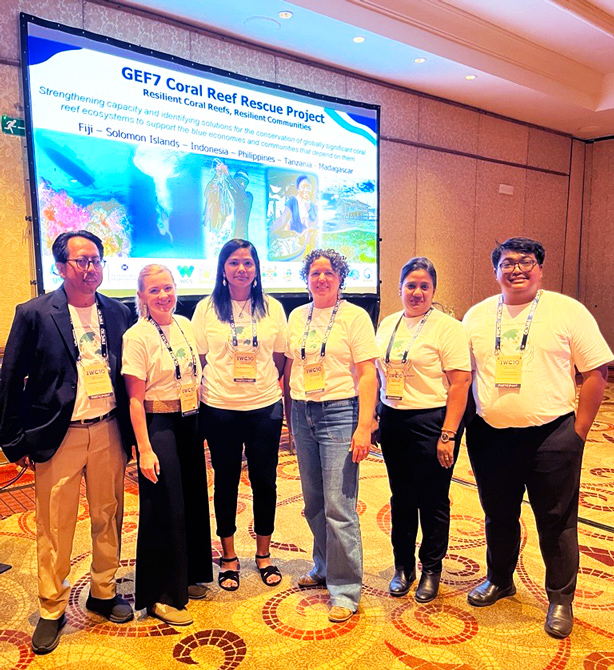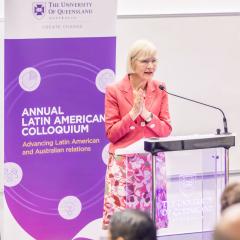As part of celebrating the 30-year anniversary of protecting waterways, Global Environment Facility (GEF) International Waters (IW) held its 10th GEF International Waters Conference (IWC10) 2024, in Punta Del Este, Uruguay. Hosted by the Government of Uruguay, the normally biennial IWC resumed in-person for the first time in 6 years, under the theme 'Transformative actions and impacts for the water and ocean SDGs'.
The GEF-funded, UQ-led Coral Reef Rescue: Resilient Coral Reefs, Resilient Communities project team, attended the IWC10 and facilitated a clinic session on conserving resilient coral reefs through national and inclusive approaches to protect coral reefs and their benefits to coastal communities.
The Coral Reef Rescue (CRR) project aims to build capacity and solutions in 6 counties (Fiji, Solomon Islands, Indonesia, Philippines, Madagascar and Tanzania) for the long-term survival of globally significant climate-resilient coral reef ecosystems, thereby supporting the communities that dependent on them.
Held on September 23–26, the IWC10 conference featured an innovation marketplace, interactive sessions, and opportunities for focused learning on project implementation and portfolio issues. The CRR Project Manager, UQ International Development’s Dr Joelle Albert led the clinic on the multi-stakeholder project.
Members of the project joined Dr Albert in Uruguay to introduce ‘National Hubs’ as platforms for inclusive governance and coral reef conservation. Using examples from Fiji and Indonesia, they showcased how planning and governance approaches are more productive if they include a variety of stakeholders across multiple sectors. The clinic demonstrated how the national hub approach can be a vehicle for partnerships and collaboration to ensure the long-term conservation and management of coral reefs through this and future projects.

The clinic was presented by project team members Neelam Bhan from Wildlife Conservation Society - Fiji, Joslin Lal - Fiji Ministry of Environment and Climate Change, Derta Prabuning, Executive Director of Reef Check Indonesia, and Prabowo from Indonesia Ministry of Marine Affairs and Fisheries.
Jacquelyn Beattie from the World Wildlife Fund GEF Agency, co-led discussions.
"The WWF GEF Coral Reef Rescue Project benefits greatly from having The University of Queensland as an executing agency that brings strong science to the forefront of project management," Jacquelyn said.
"At the innovative market place the team showcased the science-based approach to conservation of coral reefs though an interactive quiz for workshop participants.
Participants who visited the Coral Reef Rescue project booth noted they had an increased understanding of coral reef ecosystems."
Attending IWC10 provided the CRR project team the opportunity to interact with and share experiences with fellow IW colleagues.
Reef Check Indonesia Executive Director Mr Derta Prabuning said: “It was my pleasure to be able to join IWC10. I learned much through formal sessions and informal discussions with other IW practitioners. I learned a lot from others about multi-stakeholder approaches. I believe that (attending IWC10) doesn't only benefit me personally but also Coral Reef Rescue project implementation in Indonesia."

A key outcome of the project to date is the release of the first online learning course, developed by UQ’s School of Environment to provide the opportunity for global learners to build and share knowledge. Since its launch in late 2023, the course has attracted over 700 learners from 88 countries, including many from the GEF CRR target countries. This course showcases the importance of resilient coral reefs and offers solutions to help protect them.
The CRR project’s global project steering committee members include UQ Pro-Vice-Chancellor (Global Partnerships) Mr Brett Lovegrove and UQ world-leading scientist on coral reefs, Professor Ove Hoegh-Guldberg.
“We’re facing the loss of ecosystems at a very troubling state. As climate change worsens, most, if not all, of the habitats reef ecosystems depend on are also disappearing. And it doesn’t end there –our very insurance as human communities is threatened. It could mean we lose many species for hundreds if not thousands of years,” Professor Hoegh-Guldberg said.
"The struggles of our coral reefs, however, are not terminal. There is much we can do to turn these challenges around."
“The Coral Reef Rescue project builds on more than two decades of UQ research on coral reefs, including the global analysis that led to the identification of the climate-resilient coral reefs that this project is focused on protecting."
“The scale and future impacts of the Coral Reef Rescue project are really important if we are to be successful in solving the current dire circumstances."
Professor Hoegh-Guldberg, who has been in GEF projects science since the mid-1990s, is upbeat about solving the problems facing our IW challenges.
“It’s important that we start to focus on not only on describing what’s happening but also solving and implementing solutions."
"Bringing many collaborators in as partners cannot be overstated. It’s bringing communities, government and non-government organisations together to establish a common vision and identify solutions that we can all work towards!”
The Global Environment Facility (GEF) is a multilateral family of funds dedicated to confronting biodiversity loss, climate change, and pollution, and supporting land and ocean health. Its financing enables developing countries to address complex challenges and work towards international environmental goals. The partnership includes 186 member governments as well as civil society, Indigenous Peoples, women, and youth, with a focus on integration and inclusivity.
Over the past three decades, the GEF has provided more than $25 billion in financing and mobilised $145 billion for country-driven priority projects. The family of funds includes the Global Environment Facility Trust Fund, Global Biodiversity Framework Fund (GBFF), Least Developed Countries Fund (LDCF), Special Climate Change Fund (SCCF), Nagoya Protocol Implementation Fund (NPIF), and Capacity-building Initiative for Transparency Trust Fund (CBIT).
Learn more about Coral Reef Rescue
The GEF Coral Reef Rescue project contributes to a global multistakeholder partnership – the Coral Reef Rescue Initiative (CRRI) – formed to focus efforts and investments on protecting these globally significant climate refuge reefs.
The Coral Reef Rescue GEF project is implemented through the World Wildlife Fund (WWF) and executed by The University of Queensland in partnership with project country Focal National Government Ministries and national executing partners (Wildlife Conservation Society (Fiji, Solomon Islands, and Madagascar), Reef Check Indonesia, Palawan Council for Sustainable Development (Philippines) and Tanzania Marine Parks and Reserve Unit).




